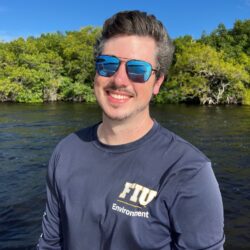Students and teachers from The Benjamin School joined Florida International University scientists for a day of hands-on research onboard R/V ANGARI.
EXPEDITION DETAILS
March 3, 2025
Palm Beach County, FL
Gina Badlowski
Mia Gabb
Victoria Goldner
Sophia Hemsi
William Sample
All sharks were fished for, caught, studied and released for research purposes under Florida permits held by Florida International University scientists.
Eager students and teachers from The Benjamin School joined R/V ANGARI crew and scientists from Florida International University (FIU) College of Arts, Sciences and Education on an exciting and informative Coastal Ocean Explorers: Sharks expedition. Participants deployed baited remote underwater video systems (BRUVS) and specialized research fishing gear known as drumlines to study and collect data on marine life in the Lake Worth Lagoon.
During the expedition, participants assembled, deployed, recovered and observed footage from two BRUVS deployments. BRUVS sit on the seafloor and consist of a metal frame that houses an underwater camera facing a bait cage. The first BRUVS survey was conducted south of the Palm Beach Inlet and captured footage of crevalle jacks (Caranx hippos) swimming past the camera. During the second survey, deployed just north of Blue Heron Bridge, the participants were thrilled to see they had recorded video of a nurse shark (Ginglymostoma cirratum) investigating the bait cage.
The other research field gear employed by the participants was drumlines, which are specifically designed for fishing for shark research. Over the course of the day, the students deployed 20 drumlines and caught three nurse sharks! Each shark was secured to the swim platform of R/V ANGARI by the FIU scientists and then collaboratively worked up by the scientists and students. The first step in each scientific workup was to measure the sharks’ precaudal and stretch total lengths. The second nurse shark was the smallest at 6.0 feet, and the third shark was the largest at 7.4 feet. After measuring, students collected small tissue samples in the form of a fin clip. They also tagged the sharks with uniquely numbered National Oceanic and Atmospheric Administration Cooperative Shark Tagging Program (NOAA CSTP) identification tags. Finally, the sex of the sharks was determined by feeling for the presence of claspers, modified fin appendages found on the underside of male sharks. All three sharks were determined to be female, as they lacked claspers. With three successful shark workups and two BRUVS deployments, it was a productive and exciting day of hands-on marine research for The Benjamin School!
CHIEF SCIENTIST

Will Sample is a Ph.D. candidate in the Marine Community and Behavioral Ecology Lab at Florida International University. His current research uses both long-term historical datasets and newer methods, such as high-resolution accelerometry, to study the movement and behavioral ecology of juvenile bull sharks. He specifically focuses on the way these sharks may be transporting nutrients across habitat boundaries, how they may be optimizing their movements to save energy and what the long-term implications of different behaviors they specialize in may be. Will’s research in the Florida Everglades studying the ways sharks move through this crucial ecosystem is important for conservation and informing habitat restoration and management efforts. Will earned a B.S. in Liberal Arts and Sciences from Florida Atlantic University in 2018 and has lived all throughout Florida for most of his life, from Jacksonville to Jupiter to the Keys. He is passionate about community outreach and education, particularly regarding Florida’s natural habitats, and currently serves as lead scientist for ANGARI’s Palm Beach County based Coastal Ocean Explorers: Sharks program aboard R/V ANGARI.


